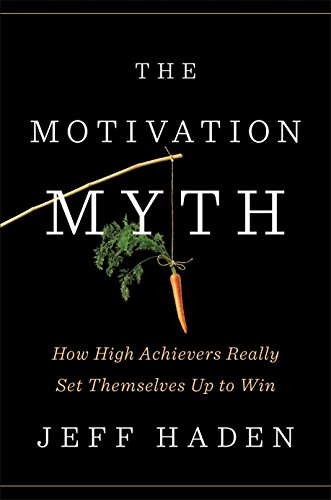Rethinking Drive, Discipline, and Success in a World Obsessed with Inspiration
“Motivation is not the spark that starts the fire. It’s the result of the fire.”
– Jeff Haden, The Motivation Myth
We all crave motivation. We wait for it, seek it in viral TED Talks, or hope it will strike like lightning on Monday morning. But what if everything we believe about motivation is wrong?
In The Motivation Myth, Jeff Haden—a popular Inc. Magazine writer and keynote speaker—turns the conventional wisdom on its head. He argues that motivation doesn’t come first—it comes last. It’s not the cause of success, but the result of consistent, disciplined effort.
Haden shows that the key to achievement isn’t about inspiration or innate drive. It’s about creating a repeatable process, setting clear goals, embracing hard work, and building momentum—step by step.
Let’s break down the core ideas in this practical and myth-busting book.
The Big Idea: Motivation Follows Action, Not the Other Way Around
The central message of The Motivation Myth is simple, yet transformative:
Don’t wait to feel motivated. Do the work anyway—and motivation will follow.
Most people think motivation is the magical fuel that gets things started. Haden argues that this is backwards. In reality:
- Accomplishment creates motivation.
- Every small win builds confidence and fuels the next step.
- Over time, consistent action leads to major results—and genuine motivation.
Waiting for motivation, on the other hand, becomes a recipe for procrastination.
Key Lessons and Principles
1. Success is Predictable, Not Mysterious
Haden debunks the myth that success is some kind of mystery, available only to the naturally gifted or obsessively driven.
Instead, he argues that success is the result of:
- Setting clear, realistic goals
- Breaking them into daily actions
- Following a routine that compounds over time
This echoes the idea of “process over outcome”—if you focus on showing up and doing the work, success becomes inevitable.
2. The Process is More Important Than the Goal
While having goals is important, obsessing over them can be counterproductive. Why?
Because goals:
- Are too far in the future
- Can lead to overwhelm or frustration
- Don’t guarantee fulfillment
Instead, Haden suggests focusing on the process:
“Success is not a big leap. It’s a series of small, boring, often unsexy steps.”
For example, if your goal is to write a book, commit to writing 500 words a day. Over time, those small wins stack up—and with each one, your motivation grows.
3. Consistency Trumps Passion
We often hear “follow your passion.” Haden flips that advice:
Passion is often the result of mastery, not the cause.
When you consistently improve at something, your confidence grows, and your enjoyment increases. You don’t need to feel passionate to start—you become passionate through progress.
So instead of searching endlessly for your “true passion,” start by getting good at something. Passion will catch up.
4. Discipline is a Muscle
Motivated people aren’t superhuman. They’ve just built discipline like a muscle, through repetition and practice.
Haden’s advice:
- Create routines that eliminate decision fatigue
- Automate as much of your daily grind as possible
- Start small and scale up—success breeds success
Discipline, not inspiration, is what keeps people moving forward.
5. Celebrate Small Wins
Every day you show up and make progress, celebrate it. These moments of progress trigger dopamine, reinforce your habits, and build internal motivation.
This creates a positive feedback loop:
- You act → you see progress → you feel good → you keep going
Tiny victories matter more than grand breakthroughs.
6. Kill the Myth of the Lightning Bolt
Haden argues that the myth of the sudden life-changing insight—the “aha” moment—is largely a fantasy.
Real success is much more mundane. It’s:
- Doing the work when no one is watching
- Failing, learning, adjusting
- Building momentum over time
Waiting for the perfect idea, opportunity, or flash of genius is a trap. Just start.
Real-Life Examples
Throughout the book, Haden shares examples of entrepreneurs, athletes, writers, and performers who built their success through effort—not innate genius or constant motivation.
Some takeaways:
- The most successful people use systems, not secrets.
- They don’t wait to feel like it—they do it because it’s part of the plan.
- They manage their time, energy, and expectations effectively.
This helps dismantle the illusion that greatness is reserved for the few. With the right approach, it’s accessible to anyone.
Practical Strategies You Can Use Today
Here are a few actionable takeaways from The Motivation Myth:
- Write down a clear, specific goal (e.g., “Write a 200-page book in 6 months”).
- Break it into daily tasks (e.g., “Write 500 words a day”).
- Commit to a routine—do it at the same time, in the same place, with no negotiation.
- Track your progress daily—use a journal, app, or wall chart.
- Celebrate every small win—build that dopamine loop.
- Ignore motivation. Do the work. Trust the process.
Final Thoughts: The Power of Doing the Work
The Motivation Myth is a refreshing antidote to the toxic productivity culture of hype and hustle. Instead of selling dreams, Jeff Haden gives us a grounded, practical, and empowering blueprint:
- Don’t wait to feel motivated.
- Define your goal.
- Create a process.
- Stick to it.
- Let small wins drive you forward.
In the end, Haden shows that success isn’t magical or mysterious. It’s just about doing the work—even when you don’t feel like it.
And as it turns out, that’s exactly what creates real, lasting motivation.
Key Takeaways
- Motivation is a result, not a prerequisite.
- Action → Progress → Motivation (not the other way around).
- Focus on the process, not the distant outcome.
- Consistency, discipline, and small wins are the real engines of success.
- Passion often follows progress—not the other way around.




